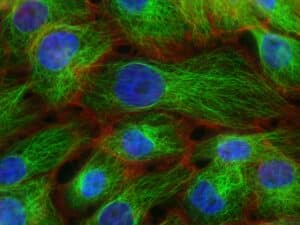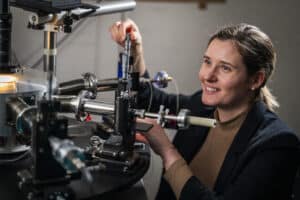Aridhia, a health and biomedical informatics company, has won a Genomics England-led Small Business Research Initiative (SBRI) competition to accelerate the development of data management and analytical techniques that will help Genomics England transfer genomic science to genomic medicine within the NHS.
Aridhia’s bid focused on the scale and accuracy of the analytics required to deliver genomic medicine as a routine service by enabling the industrialisation of multiple annotation pipelines from different sequence and bio-informatics providers. If healthcare and research organisations are to deliver on the promise of genomic medicine, considerable developments around the integration, clinical validation and curation of large scale clinical and genomic datasets remain.
The objective of the competition was to discover innovative technologies that would address the requirements of Genomics England’s 100k Genome Project and demonstrate that the solution could provide the NHS with meaningful and actionable data based on patients’ genetic material, with the goal of making this data a routine part of clinical decision making.
The Department of Health is investing up to £10m in this competition, which will be managed by Genomics England Limited and which is expected to run in two phases.
The ground-breaking work will be carried out at the Stratified Medicine Scotland Innovation Centre on AnalytiXagility, the recently launched healthcare and research data science platform developed by Aridhia. The consortium of specialists involved in the project and led by Aridhia includes Fios Genomics, EMC and Pivotal.
David Sibbald, CEO of Aridhia, explains: “Clinical interpretation of sequence data can inform likely disease progression, prognosis and can identify potential response to treatment. Ultimately this could lead to improved treatment success rates and reduce unnecessary side effects. One of the key challenges is the availability of industrial-strength annotation pipelines that can be deployed at scale and integrated effectively with a range of other data associated with patient care and treatment.”
Whole genome sequencing is predominantly a research activity today with genomic annotation currently a limited add-on to diagnostics. The Aridhia-led collaboration aims to develop an innovative set of annotation services technologies, based on its existing AnalytiXagility platform, which will address the challenges of delivering clinically relevant reports, as well as the operational challenges in storing and linking genomic and phenotype data.
The ultimate aim is to identify the best way to present this information to clinicians in an easily interpreted format, giving the NHS access to clinically relevant, actionable information which can be used to directly influence patient care.
The project will run in two phases. Firstly the AnalytiXagility platform will be extended to execute instrumented annotation pipelines, yielding valuable data to improve those services. Scalability tests will be run. Secondly, the service will be integrated with NHS systems to demonstrate how genomic data can form part of a patient’s electronic health record in a way that can be used in specialist care. Direct integration of clinical records from the NHS is also expected, along with qualitative measures of user acceptance demonstrated in an NHS setting.






















